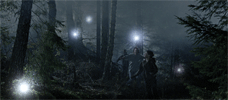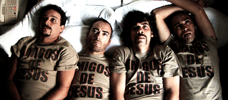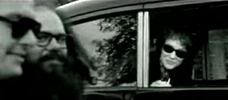Reviews
Susanne Bier
USA, 2007
Credits
Review by Tom Huddleston
Posted on 29 October 2007
Source Paramount Pictures 35mm print
Categories The Times BFI 51st London Film Festival
In the wake of September 11th, two seemingly diverse but oddly complementary movements have sprung up in American cinema. The first and most notorious is the ongoing wave of “torture porn” films that explore the American fear of the unknown, of the “foreign,” and exploit that fear in the most gruesome, brutal ways imaginable. The second is a more subtle, an equally pervasive movement that is as yet unnamed, but you could perhaps call it “emo-porn;” films that, like their more horrific counterparts, subsume character development and cinematic distinctiveness in the service of provoking physical emotions in the viewer, and in this case, feelings of extreme grief, loss, and despair. In this category one might place 21 Grams (undoubtedly the key text here), Reign Over Me, World Trade Center, House Of Sand and Fog, and arguably Crash and Million Dollar Baby, both Best Picture winners. Often centering around middle class “all-Americans,” these films focus on the minutiae of common suffering, creating a detailed blueprint for coping with the horror and alienation the filmmakers perceive to be at the heart of modern existence. If, as in most cases, these stories suggest the existence of a light at the end of the tunnel, such catharsis can usually only come in the form of grim acceptance.
The latest in this wave of feelbad extravaganzas is Susanne Bier’s Things We Lost In The Fire, a double whammy of marital bereavement and drug addiction. When Audrey Burke’s husband Brian is shot and killed, she is left alone with two pre-teen children in their massive suburban home. In her despair she reaches out to Jerry Sunborne, her husband’s oldest friend, and a relapsed heroin addict. Audrey and Jerry have never been friends (she resented the way he seemed to take advantage of her husband’s kindness) but she now invites him in, setting him up in the converted garage and nursing him back to normality.
Like a number of plot developments in the movie, the reasons behind Audrey’s decision are never made clear. Perhaps she needs companionship, a man around the place, though why she chooses the one man she clearly can’t stand is left for the viewer to divine. Such details are unimportant here; what’s important is the pain both characters are in, and the opportunity they now have to explore and express that pain in a mutual, preferably conflicting fashion. Audrey lashes out at her children, alternately blames, resents and forgives Jerry, and spends a lot of time taking showers, while Jerry pulls himself together, bonds with the kids, takes a mortgage bondsman’s exam and then inevitably relapses, giving Audrey the opportunity to (again) resent, then forgive and rescue him. Character and motivation are discarded here, as what’s pertinent is that we know they’re hurting, and that we hurt along with them.
Things We Lost In The Fire is a very well made film; tightly structured and solidly scripted, there are a few truly memorable lines (one character describes his wife as “taking all her decorating tips from Uday Hussein”) and some nicely judged moments. The photography is adequate, though efforts to be distinctive, often with the use of extreme close-ups of Halle Berry’s eyes, generally fall flat. The direction is unflashy and appropriate, and the music, though occasionally repetitive and overwrought, is perfectly acceptable Hollywood fare. The film certainly never becomes boring, stringing us along with enough plot diversions and drama to keep the interest up.
But it’s all so horrendously manipulative. Halle Berry clearly took the role of Audrey in an attempt to get back to her post-Monster’s Ball, pre-Catwoman position as a respected actress, and essentially offers up much the same routine as she did in that Oscar-winning role (another key text for the emo-porn afficionado). For most of the film she alternates between two facial expressions, namely sadness and resentment, before being asked to upgrade to explosive and angry, and finally wearied and accepting. Benicio Del Toro gets by far the juicier role, and does a fair amount with it. The flashback scenes he has with David Duchovny (as the deceased husband) hint at a much more entertaining story, as friends separated by circumstance, but still bonded by history (in fact, that movie was made, it was called Reign Over Me, and while no masterpiece, it was certainly better than this). The problem, perhaps, is that Jerry is likeable from the start. We know he’s good with kids long before it’s revealed he’s a junkie, so there’s never any question as to his journey—we know he’ll find strength, we know he’ll relapse, and we know he’ll come out of it a tougher, wiser human being.
The incidental characters are a mixed bag. Duchovny is his usual amenable self, though his character is entirely one-dimensional as the perfect husband and buddy, now cruelly snatched away (he even dies heroically, breaking up a violent marital spat in the street). The kids don’t fare so well, caught somewhere between wiseass awareness and doe-eyed uncomprehension, their personalities seemingly switching to suit the scene. Alison Lohman’s character seems caught in the same trap—she starts off hapless and seemingly besotted with Jerry, but bizarrely develops into a sage advisor, bringing Audrey through the cold turkey process and, in a genuinely odd dinner table scene, helping the entire family to come to terms with their loss. The most enjoyable character is John Carroll Lynch’s neighbour Howard, a wealthy loser who hates his wife, and whose unflinching acceptance of Jerry’s past leads to a budding friendship that unfortunately never goes anywhere.
Things We Lost In The Fire wants so desperately to mean something, anything to its audience, and ends up coming off like a slightly more intelligent take on the Lifetime network’s movie of the week. The only reason a writer or director decides to tell a story like this is to provoke abject feelings, and the only reason an audience comes is to suffer, which isn’t necessarily meant as a criticism—some viewers get a thrill out of shared grief, as the success of movies like Million Dollar Baby and Monster’s Ball will readily attest. However, it helps if like those movies, there’s something else going on behind the tears, some root of genuine humanity. Too many of these films exist simply to provoke and distress, offering grief as product.
More The Times BFI 51st London Film Festival
-

Island of Lost Souls
2007 -

Garage
2007 -

Exodus
2007 -

Friends of Jesus
2007 -

We Want Roses Too
2007 -

The Trap
2006 -

Captain Ahab
2007 -

Shotgun Stories
2007 -

Savage Grace
2007 -

The Assassination of Jesse James by the Coward Robert Ford
2007 -

The World Unseen
2007 -

Things We Lost In The Fire
2007 -

Lions for Lambs
2007 -

Talk to Me
2007 -

Redacted
2007 -

Battle For Haditha
2007 -

Chaotic Ana
2007 -

Angel
2007 -

Juno
2007 -

Fay Grim
2006 -

Reservation Road
2007 -

I’m Not There
2007
We don’t do comments anymore, but you may contact us here or find us on Twitter or Facebook.



